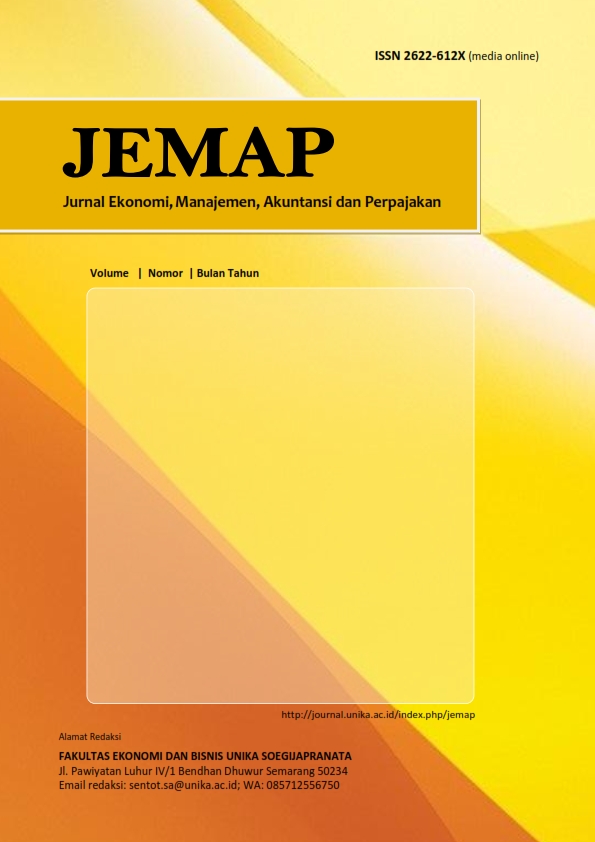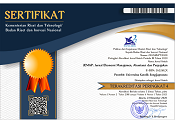Pengaruh Interaksi Corporate Social Responsibility dan likuiditas Saham Terhadap Earnings Response Coeficient Studi pada Perusahaan Pertambangan di Bursa Efek Indonesia
Abstract
Keywords
Full Text:
PDFReferences
Ambarwati, S., 2008. Pengaruh Return Saham, Volume Perdagangan Saham dan Varian Return Saham Terhadap Bid-Ask Spread Saham Pada Perusahaan Manufaktur yang Tergabung dalam Index LQ 45 Periode Tahun 2003-2005. Jurnal Siasat Bisnis, 12(1), pp. 27-38.
Arifin, J. & Wardani, E. A., 2016. Islamic Corporate Social Responsibility Disclosure, Reputasi, dan Kinerja Keuangan: Studi Pada Bank Syariah di Indonesia. Jurnal Akuntansi & Auditing Indonesia, 20(1), pp. 37-46.
Awuy, V. P., Sayekti, Y. & Purnamawati, I., 2016. Pengaruh Pengungkapan Corporate Social Responsibility (CSR) Terhadap Earnings Response Coefficient (ERC): Suatu Studi Empiris Pada Perusahaan Pertambangan yang Terdaftar di Bursa Efek Indonesia Pada Tahun 2010-2013. Jurnal Akuntansi dan Keuangan, 18(1), pp. 15-26.
Ball, R. & Brown, P., 1968. An Empirical Evaluation of Accounting Income Number. Journal of Accounting, pp. 159-177.
Barney, J., 1991. Firm Resources and Sustained Competitive Advantage. Journal of Management, 17(1), pp. 99-120.
Beaver, W. H., 1968. The Information Content of Annual Earning Annoucement. Empirical Research in Accounting: Selecetd Studies, pp. 67-92.
Brown, W., Helland, E. & Smith, J., 2006. Corporate Philanthropic Practice. Journal of Corporate Finance, 12(5), pp. 855-877.
Collins, D. W. & Kothari, S. P., 1989. An Analysis of Intemporal and Cross Sectional Determinal of Earnings Response Coefficient. Journal of Accounting and Ecconomics, Volume 11, pp. 142-182.
Daud, R. M. & Syarifuddin, N. A., 2008. Pengaruh Corporate Social Responsibility Disclosure, Timelines, dan Debt Equity Ratio Terhadap Earnings Response Coefficient (Studi Empiris Pada Perusahaan Manufaktur yang Terdaftar di Bursa Efek Indonesia). Jurnal Telaah dan Riset Akuntansi, 1(1), pp. 82-101.
Dhaliwal, D., Li, O. Z., Tsang, A. H. & Yang, Y. G., 2011. Voluntary Non-Financial Disclosure and The Cost of Equity Capital: The Case of Corporate Social Responsibility Reporting. The Accounting Review, 86(1), pp. 59-100.
Fombrun, C. & Shanley, M., 1990. What's in a Name? Reputation Building and Corporate Strategy. Academy og Management Journal, Volume 33, pp. 233-258.
Foster, G., 1970. Accounting Eraings and Stock Price of Insurance Companies. The Accounting Review, Volume October, pp. 686-698.
Godfrey, J. et al., 2010. Accounting Theory. 7th ed. penyunt. Australia: John Wiley Sons.
Gunawan, B. & Utami, S. S., 2008. Peranan Corporate Social Responsibility dalam Nilai Perusahaan. Jurnal Akuntansi dan Keuangan, 7(2), pp. 174-185.
Hartono, J., 2009. Teori Portofolio dan Analisis Investasi. Edisi Keenam penyunt. Yogyakarta: BPFE.
Herlina & Magdalena, N., 2008. Pengaruh Volume Perdagangan dan Rasio Fundamental Perusahaan Terhadap Harga Saham: Studi Empirik Pada Saham Sektor Perkebunan di Bursa Efek Indonesia. Prosiding Simposium Nasional Hasil Riset Ekonomi dan Bisnis Asosiasi Perguruan Tinggi Katolik, pp. 111-122.
Hidayati, N. N. & Murni, S., 2009. Pengaruh Pengungkapan Corporate Social Responsibility Terhadap Earnings Response Coefficient Pada Perusahaan High Profile. Jurnal Bisnis dan Akuntansi, 11(1), pp. 1-18.
Kwang En, T., 2002. Pengaruh Koefisien Respon Laba Akuntansi Terhadap Harga Saham dalam Masa Krisis Ekonomi di Indonesia. Jurnal Ilmiah Akuntansi FE-UKM, 2(1), pp. 63-73.
Larkin, J., 2003. Strategic Reputation Risk Management. New York: Palgrave McMillan.
Mayangsari, S., 2004. Bukti Empiris Pengaruh Spesialisasi Industri Auditor Terhadap Earnings Response Coefficient. Jurnal Riset Akuntansi Indonesia, 7(2), p. 154.
Murwaningsari, E., 2009. Hubungan Corporate Governance, Corporate Social Responsibility dan Corporate Financial Performance Dalam Satu Continuum. Jurnal Akuntansi dan Keuangan, 11(1), pp. 30-41.
Palupi, M. J., 2006. Analisis Faktor-Faktor yang Mempengaruhi Koefisien Respon Laba: Bukti Empiris Pada Bursa Efek Jakarta. Jurnal Akubank, Volume 3, pp. 9-25.
Ramanna, K., 2013. A Framework for Research Corporate Accountability Reporting. Accounting Horizon, 27(2), pp. 409-432.
Riyatno, 2007. Pengaruh Ukuran Kantor Akuntan Publik Terhadap Earnings Rsponce Coefficinet. Jurnal Keuangan dan Bisnis, 5(2), pp. 148-162.
Rofika, 2015. Faktor-Faktor yang Mempengaruhi Earnings Response Coefficient (ERC) Pada Perusahaan Manufaktur yang Terdaftar di Bursa Efek Indonesia. Jurnal Akuntansi, 3(2), pp. 174-183.
Rustiarini & Wayan, N., 2010. Pengaruh Corporate Governance Pasa Hubungan Corporate Social Responsibility dan Nilai Perusahaan. Purwokerto, Simposium Nasional Akuntansi XII.
Santoso, G., 2015. Determinan Koefisien Response Laba. Parsimonia, 2(2), pp. 69-85.
Sayekti, Y. & Wondabio, L. S., 2007. Pengaruh CSR Disclosure Terhadap Earning Response Coefficient (Suatu Studi Empiris Pada Perusahaan yang Terdaftar di Bursa Efek Jakarta). Dalam: Simposium Nasional Akuntansi X. Makasar: s.n., pp. 26-38.
Scott, W. R., 2009. Financial Accounting Theory. Toronto: Pearson.
Sidik, I. & Reskino, 2016. Zakat and Islamic Corporate Social Responsibility: Do These Effect the Performance of Sharia Banks?. Journal of Economics and Business, 1(2), pp. 161-184.
Sudarma, I. P. & Ratnadi, N. M. D., 2015. Pengaruh Voluntary Disclosure Pada Earnings Response Coefficient. E-Journal Akuntansi Universitas Udayana, 12(2), pp. 339-356.
Suta, I. P. G. A., 2006. Kinerja Pasar Perusahaan Publik di Indonesia. Suatu Analisis Reputasi Perusahaan. Jakarta: Yayasan Sad Satria Bhakti.
Suwardjono, 2005. Teori Akuntansi: Perekayasaan Pelaporan Keuangan. Edisi Ketiga penyunt. Yogyakarta: BPFE.
Watts, R. L. & Zimmerman, J. L., 1986. Positive Accounting Theory. New York: Prentice Hall.
DOI: https://doi.org/10.24167/jemap.v1i2.1559
Refbacks
- There are currently no refbacks.
e-ISSN 2622-612X | View My Stats







